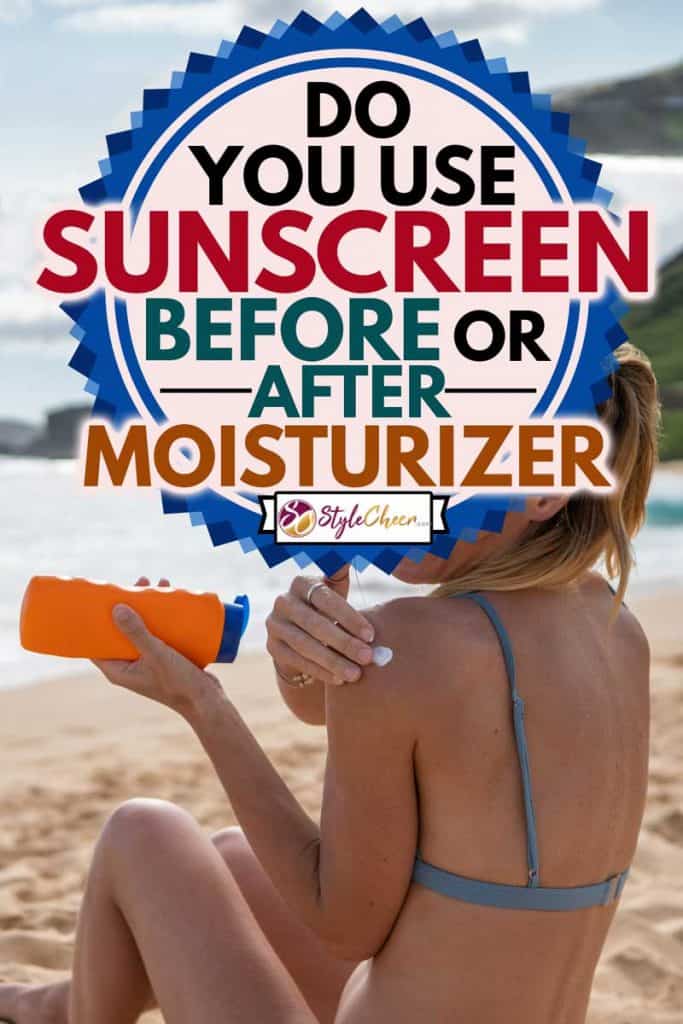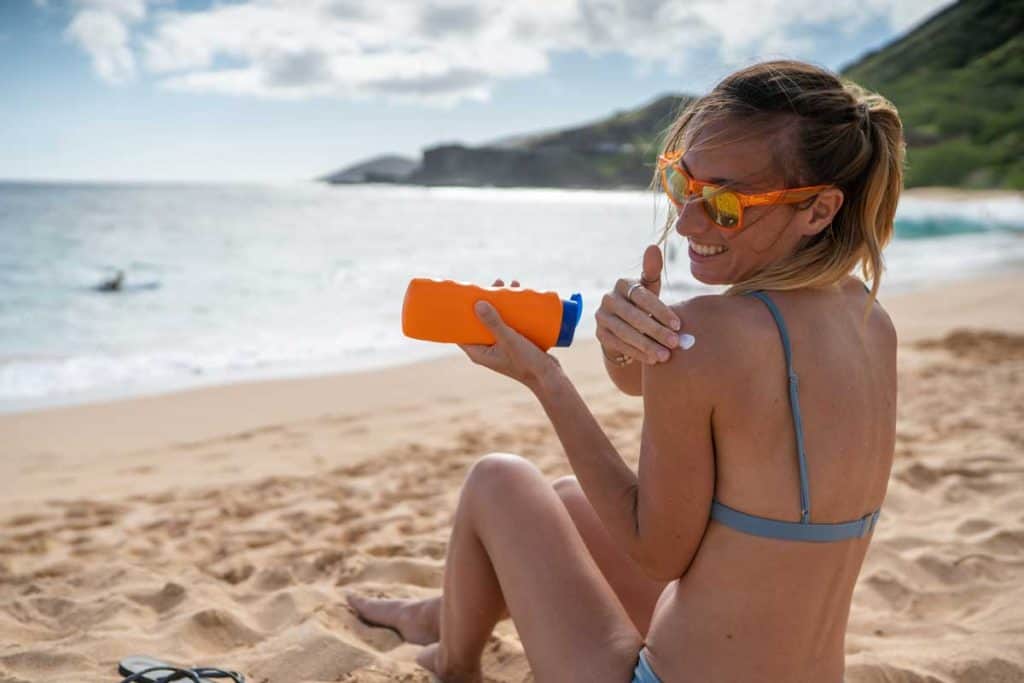You use daily moisturizer but are spending more time in the sun. Should you put your sunscreen on before or after your moisturizer? Both products work wonders for maintaining healthy skin. We've done some research to see what the experts say about the application process.
The order for applying sunscreen depends upon the type of sunscreen you are using. Apply chemical sunscreens before the moisturizer in order for them to fully soak into the skin. Apply mineral sunscreens after you've applied your moisturizer.
Let's look more closely at why this is the case in this post. We'll also talk about SPF levels, using a moisturizer SPF combo, when you should wear sunscreen, and when sunscreen may be bad for you or the environment. Please keep reading.

This article may include affiliate links and elements that were carefully created by our team using advanced ai to help you envision the best style advice.
The Best Order To Apply Your Facial Sunscreen
When talking about sunscreens, there are two types: chemical sunscreens and mineral (or physical) sunscreens. The chemical sunscreens soak into your skin and protect it. Physical sunscreens act like a total block to the sun and create a layer on your skin that shields it from the sun. How you apply the two is completely different.
Chemical Sunscreens
Chemical sunscreens (look for ingredients like oxybenzone and avobenzone) are best applied before your moisturizer. This way they have time to soak into your skin and create that effective sun barrier.
Click here for this sunscreen on Amazon.
Physical Sunscreens
Physical or mineral sunscreens are those that contain zinc oxide or titanium oxides. These sunscreens should be applied after your moisturizer but before your makeup.
Click here for this sunscreen on Amazon.
Is There Any Risk To Mixing Moisturizer And Sunscreen?
There's no risk of wearing both, but it is important to know which type you're wearing in order to get the order correct. Applying moisturizer over physical sunscreen can dilute its efficacy. And applying chemical sunscreen over moisturizer can prevent absorption. So the risk comes from getting it wrong and leaving your skin unprotected from the sun.
What About Wearing A Moisturizer Mixed With Sunscreen?
It's great to wear a moisturizer mixed with sunscreen. The trick is to find one with at least 30 SPF and that has both UVA and UVB protection. (SPF 30 blocks about 97% of the sun's rays and upping it to SPF 50 only gains you one percentage point, so don't stress looking for anything above a 30.)
As your skin's needs fluctuate, you may find the perfect moisturizer doesn't have the correct amount of SPF. If that's the case, just follow the rules for the order of application and you'll be fine.
What Is The Best Moisturizer With SPF?
Many people like the ease of using a moisturizer and SPF combination. This way, you have a bit of sun protection even if you forget to apply the full SPF lotion. Most moisturizers contain 20-25 SPF, but try to find 30 SPF to ensure protection for your skin.
CeraVe Facial Lotion
This moisturizing lotion from CeraVe is a best-selling daily moisturizer. It has 30 SPF for full protection.
Click here for this product on Amazon.
Nars Tinted Moisturizer
Nars sells this tinted moisturizer with SPF 30 for a true all-in-one layer for your face as it provides coverage as a foundation does. It's available in 10 different skin tones.
Click here for this product on Amazon.
Mario Badescu Moisturizer
If you're looking for a sensitive skin product, this oil-free moisturizer with 30 SPF from Mario Badescu is wonderful.
Click here for this product on Amazon.
What Is The Best SPF Level For Your Face?
The American Dermatological Association recommends no lower than 30 SPF for anywhere you want to protect from the sun. They also suggest a broad-spectrum sunscreen that will protect against both UVA and UVB rays. Water-resistance is also good to have as you want your sunscreen to last as long as possible both in the water or if you are sweating.
Cream sunscreens are the best type of sunscreen for your face, especially if you have any dry areas.
How Often Should I Reapply Sunscreen?
Dermatologists recommend reapplying your sunscreen no less than every two hours. If you're swimming or sweating and it's the peak hours for UV rays, you may want to apply it more frequently. It's better to err on the side of too much than too little when you're outside in the hot sun.
Is It Bad To Wear Sunscreen Every Day?
This is a tricky question that depends upon the ingredients your sunscreen contains. Currently, the FDA is investigating some ingredients used in sunscreens to determine their long-term safety when absorbed into the skin over time. The two ingredients commonly found in sunscreen that are totally safe are titanium dioxide and zinc oxide.
The ingredients under question are PABA and Tolamine salicylate. Neither of these ingredients is legally sold in U.S. sunscreens.
A good rule of thumb is to check the UV index if you know you're going to be outdoors. Most weather apps will give you this information. If the UV index is 0-2, you're safe outside without sunscreen. If it's 3-5, there's a moderate risk, so if you're going to be out for more than an hour or so, it's probably best to apply sunscreen. Anything 6 or higher, you should fully protect yourself.
What Sunscreens Are Safe For Coral Reefs?
In 2016, scientists and researchers at NOAA found that a common chemical in suncare products has a detrimental effect on the ocean's coral reefs. The ingredient Oxybenzone, or BP-3, is found in more than 3,500 skincare products worldwide. It enters the reefs not only through consumer use in the oceans but also through wastewater.
The good news is, because of this discovery, we as consumers have the power to stop using those products. Use sunscreens that are safe for the reefs and other ocean ecosystems instead.
Reef Repair Sunscreen
Reef Repair products are made with the oceans in mind. These products provide reef-safe, biodegradable, and strong broad-spectrum mineral-based sun protection from UVA/UVB rays to help protect you from sunburn and DNA damage. This (non-nano) Zinc Oxide sunblock gives you the strongest mineral sun cream UV protection available.
Click here for this product on Amazon.
Skin Friendly Sunscreen
This 30 SPF sun protection is not only reef-friendly in its ingredients, but ocean-friendly in its use of recycled plastic for its bottles. Each bottle blends aloe vera gel, green tea extract, watermelon extract, coconut oil, mango butter, and vitamin E to keep skin moisturized and safe from the sun. Sun blocking ingredients include Avobenzone 3.00%, Octisalate 5.00%, Octocrylene 5.00%, but nothing that is harmful to the reefs.
Click here for this product on Amazon.
Kokua Skin Care
Kokua Skin Care makes a strong 50 SPF sunscreen that is reef-safe. It goes on like a moisturizing lotion and is light enough for everyday use. This sunscreen has superior water resistance and stays on through sweat and swells while protecting you from the harshest UV rays.
Click here for this product on Amazon.
Should You Wash Off Sunscreen Before Bed?
It's always a great idea to wash your face before going to bed. Not only will you want to get rid of any chemicals or minerals from your sunscreen, but also any grime from the day. For some people, the zincs and other oxides can be drying to the skin. Leaving it on overnight will only exacerbate the problem. So yes, wash off that sunscreen. See our post here: What To Apply On Your Face Before Sleeping?
Protect Your Skin

The main takeaway from this is to wear your sunscreen. Sun can do damage to your skin and cause more serious complications over time. Protecting your skin will keep your skin looking youthful and radiant for years to come.
If you enjoyed this post here at StyleCheer.com, please check out these others we think you may enjoy below:









![Scientist holding Cyanoacrylate glue, Is There An Eyelash Glue Without Cyanoacrylate? [A Guide to Finding Safe Alternatives] - 1600x900](https://stylecheer.com/wp-content/uploads/2023/09/shutterstock_2238414685-300x169.jpg)
![Applying lash glue onto fake eyelashes, Why Is My Lash Glue Not Sticking? [Common Reasons and Solutions] - 1600x900](https://stylecheer.com/wp-content/uploads/2023/09/shutterstock_1059533828-300x169.jpg)
![Pouring black lash glue onto a small mat, What Glue Do Lash Techs Use? [A Guide to Lash Extension Adhesives] - 1600x900](https://stylecheer.com/wp-content/uploads/2023/09/shutterstock_1541038103-300x169.jpg)